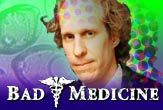What Beef Cattle Gives the Most Prime Meat
My Big Beef with Cloned Cattle

The meat and milk from cloned animals are safe to consume and should exist immune for sale, according to the U.S. Nutrient and Drug Administration.
And you'll never know, anyhow, considering the labeling volition exist a clone of the labeling used for non-cloned beefiness. No special labeling is needed, the FDA says in an commodity published in the January. 1 issue of Theriogenology and in the full 678-page report posted on the FDA web site last calendar week.
The less we know the ameliorate, apparently. Why else would the results of a four-year investigation in cloning safety be announced quietly between Christmas and New Year's?
Cloning dates back hundreds of days
On one level, we've allowed cloned beef to penetrate America for years. Information technology's called McDonald'southward. While not technically cloned, all billion or and so of the hamburger patties sold are indistinguishable from each other. This is our future.
| Bad Medicine |
| Bad Medicine appears each Tuesday on LiveScience. Previous columns: |
On another level, you might accept already eaten real cloned beef. Cloning livestock has been going on for v years now, and the FDA just initiated a voluntary moratorium in 2003 on the commercial sale of the offspring of cloned animals. In this era of censorship and compromised priorities at the CDC, EPA and NASA, the FDA didn't have the teeth to make the auction of cloned animal products illegal.
Cloning advocates are already painting us concerned consumers as Luddites, with minds too feeble to comprehend that cloning is just an extension of animal husbandry practices that have taken identify for centuries. This is a natural progression, they say, like feeding herbivorous cattle the ground-up remains of other animals, which somehow brought nigh mad cow disease.
Equally safe as cloned female parent's milk
Are cloned brute products safety? Probably, simply that's not the whole issue. Cloned cattle would be a chip off the old chipped beefiness, genetically identical to the progenitors. Scientists accept the Deoxyribonucleic acid of a prized balderdash or dairy cow and insert this into a hollowed-out about microscopic cattle egg. An electrical daze, eerily familiar to Frankenstein, induces the egg to abound.
Event one is long-term man safety. While the practice is probable safe, only a few years have passed since the dawn of cloning to truly understand the impact this would take on millions of livestock consumed by hundreds of millions of people.
Issue two is the long-term viability of the food supply. Nature likes diversity; this is why most animals reproduce sexually. A disease can more easily wipe out an entire herd if each animal is genetically identical.
Issue iii is the appalling secrecy. Consumers have the right to know whether their food product was raised in a thing that is adequate to them. Of course the biggest producers don't want the FDA to require special labeling. The majority of consumers are queasy with the idea of cloning animals, as revealed in a recent poll by the Pew Initiative on Nutrient and Biotechnology.
Issue iv is the necessity. Why do we demand to clone livestock? It's because big business, the face of American farming practices, demands identical products for mass production. And these identical slabs of meat line the meat sections of identical supermarkets from Albuquerque to Yonkers.
Uncertain futurity
Butchers have nigh entirely disappeared from America. Gone is the 24-hour interval of specialty cuts and regional flavors. Instead, iv meatpacking companies slaughter and packet about 85 percent of all beef in the United States, according to the USDA. Supermarkets simply rent a few meat-cutters to trim the near finished product.
The biggest meat producers will likely require their suppliers to provide a genetically perfected product, which merely the largest suppliers could afford to do. Once once more, the lilliputian guy is marginalized. Already I am unable to purchase many of the meat products I grew up with in my Italian neighborhood, similar sweetbreads. Pocket-size farmers are barred by law from slaughtering their own animals; and the overtaxed slaughterhouses will just return certain cuts.
Such is the diverseness of the American nutrient supply system. Cloning will bring more of the same. We accept until April two to complain to the FDA about this. And then the FDA will make its final decision.
Christopher Wanjek is the author of the books "Bad Medicine" and "Food At Piece of work." Got a question about Bad Medicine? E-mail Wanjek. If it'due south actually bad, he just might answer it in a future column. Bad Medicine appears each Tuesday on LIveScience.
- Cow-free Beefiness Proposed
- 21st Century BBQ: Jucier Beef from Cloned Cows
- Food Science: Building Improve Steaks, Wings and 'Chops
- Pork Makeover: New Push for Nighttime Meat
charbonneauexceer.blogspot.com
Source: https://www.livescience.com/9484-big-beef-cloned-cattle.html
Belum ada Komentar untuk "What Beef Cattle Gives the Most Prime Meat"
Posting Komentar